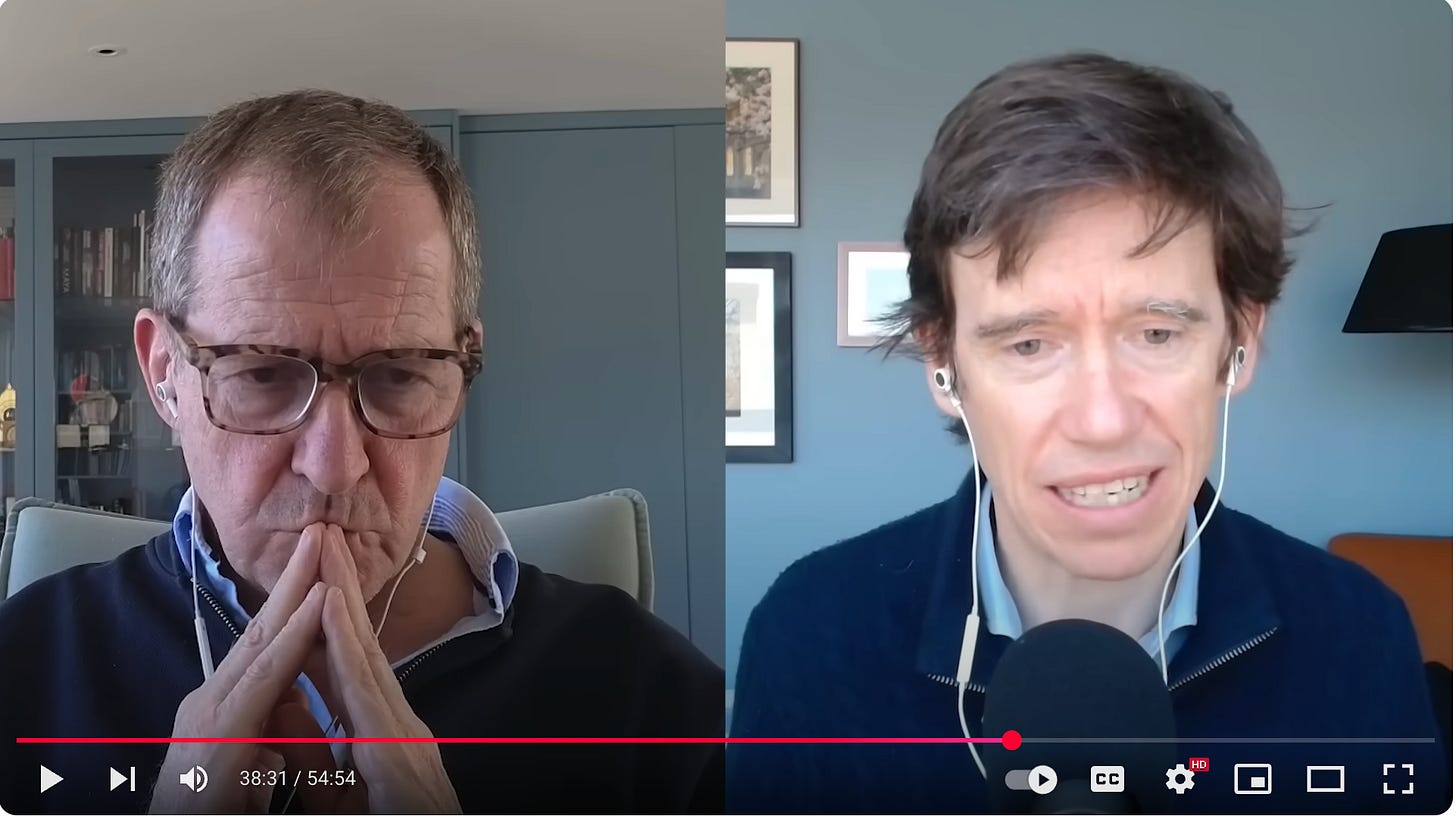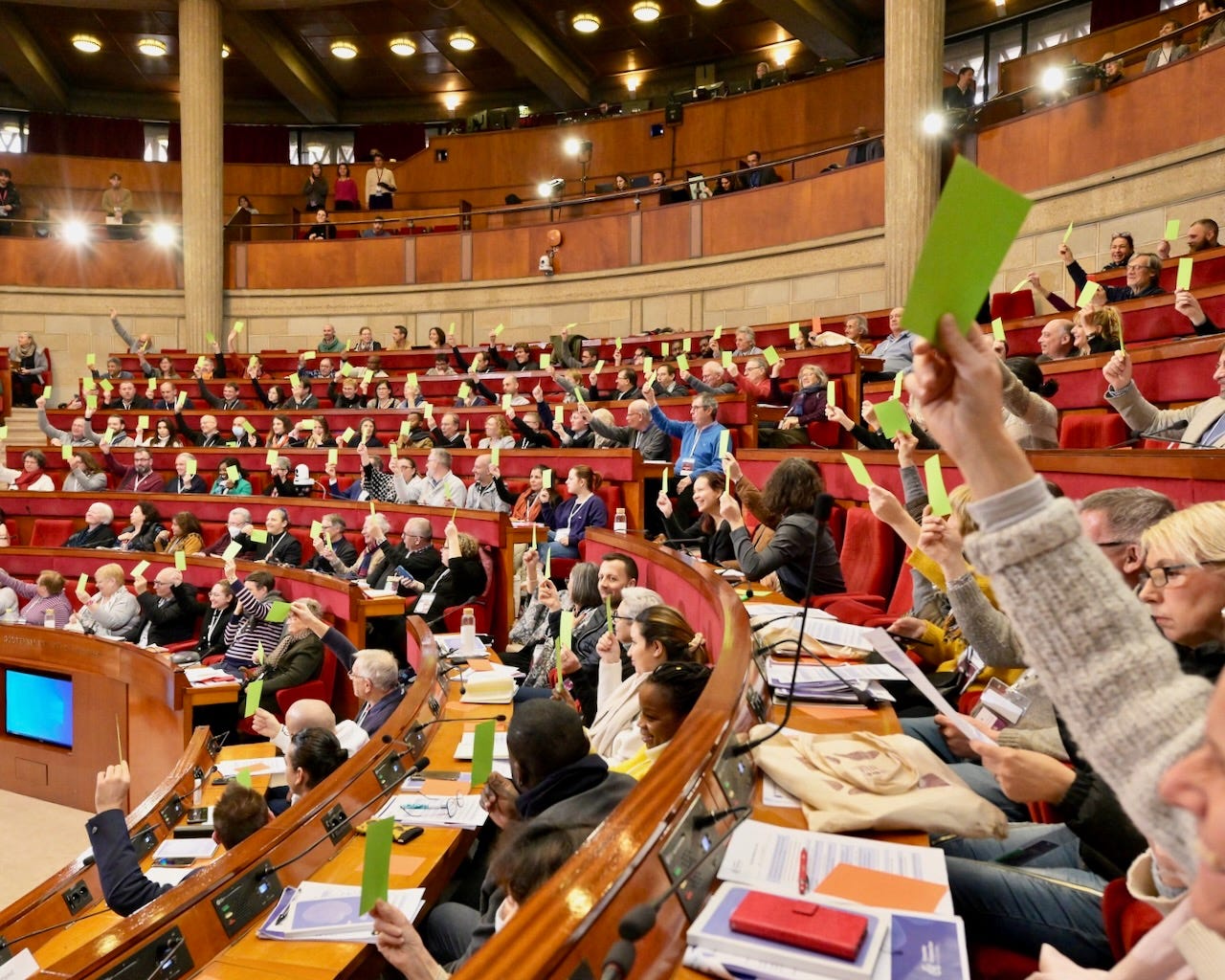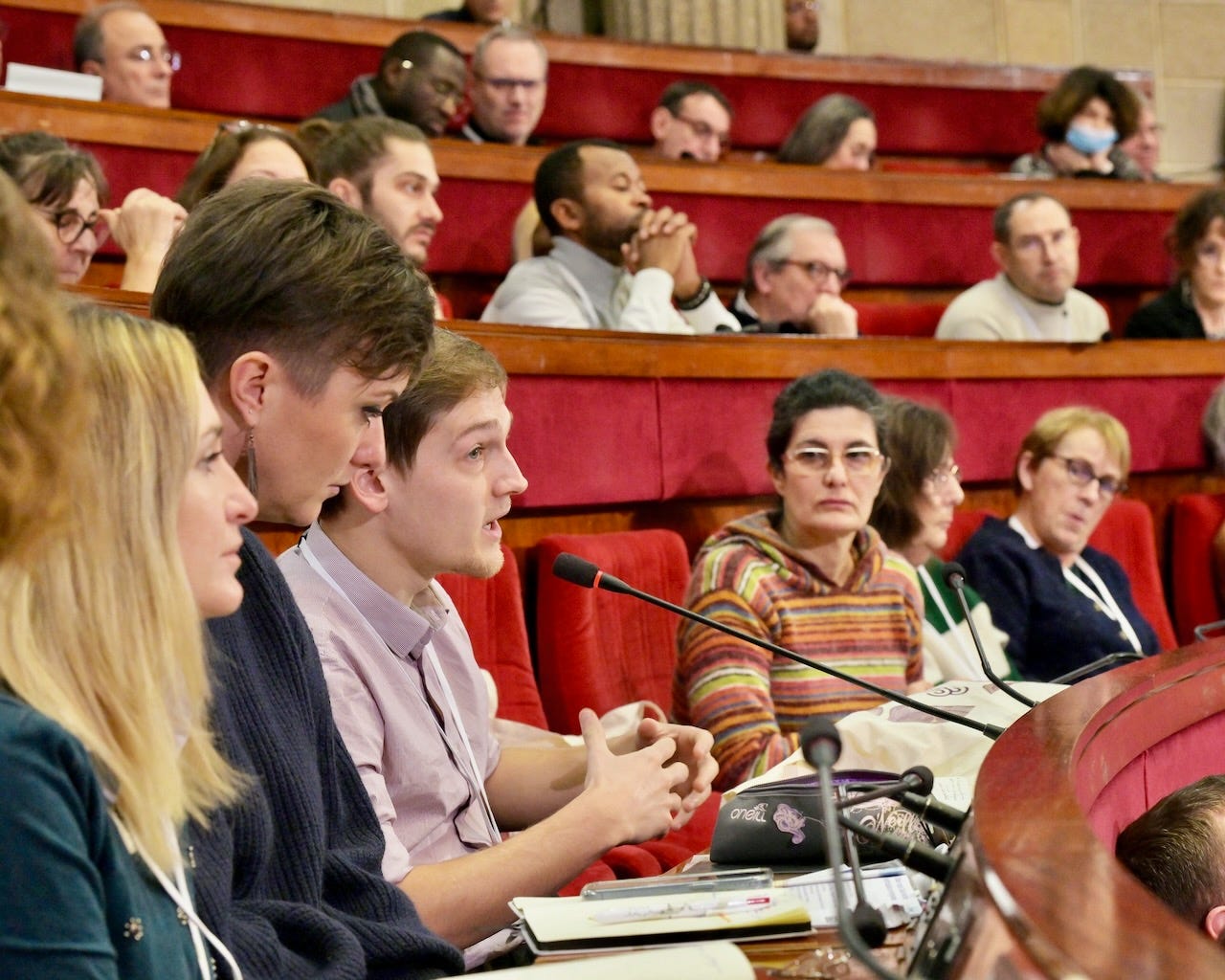Citizens' assemblies inch into the mainstream
A top UK podcast singles out sortition as democracy's way forward
Citizens’ assemblies have earned a significant new seal of approval.
Alongside its successful commentary on global events, the UK's top political podcast The Rest is Politics stands out as a running indictment of electoral representation as a system of government, implicitly at least. But the main hosts, Alastair Campbell and Rory Stewart, had so far failed to follow the logic of their own arguments and to propose alternative methods to take important national decisions.
They have now done so with an intentional endorsement of citizens’ assemblies as their preferred way forward for democratic reform.
Citizens’ assemblies are randomly selected groups of people from a community or country – a process also called sortition – and are mandated to solve a tough policy problem. They meet for a number of days, hear from experts, deliberate among themselves and adopt whatever ideas receive a supermajority vote of approval.

The UK's current form of representative government “feels increasingly strange”, Stewart says. Campbell adds: “the system is creaking and the respect for it is not there.” (For a select transcript, see below).
Millions of people around the world listen each month to The Rest is Politics podcast, which is most influential in the UK. Campbell and Stewart's endorsement is another step for sortition toward the British mainstream, where citizens’ assemblies are not yet widely discussed.
The unusual formality of the segment was in answer to a specially chosen question about a citizens' assembly in Cumbria on climate change. It is part of a growing recognition that the world’s 250-year-old experiment in elections-based government has run out of steam and that we need to evolve new democratic processes.
Credibility and legitimacy
Campbell and Stewart’s comments give credibility and legitimacy to citizens’ assemblies – just two decades old in their modern form – and the greater deliberative democracy movement.
At least four national citizens’ assemblies have already been held in Britain on Brexit, on nature, on climate and on democracy. (One of the best global lists of several hundred citizens’ assemblies held around the world in recent years is here).
The UK has also seen several smaller, randomly selected citizens’ panels and juries at the local level as well, dealing with topics from the climate to traffic schemes.
The podcasters focused on the concrete step of reforming the UK’s upper house of parliament, the House of Lords. In Stewart's mind, this could mean adding a new third chamber. They could also have mentioned a campaign started by the Sortition Foundation to replace it entirely with a House of Citizens (the petition is here).
How such a permanent assembly would work is the subject of much debate. Stewart envisions it as a body for vetting legislation by the elected assembly. However, existing new permanent randomly-selected assemblies, for instance in Paris and Belgium’s German-speaking community, don't go into detail on individual policy challenges. Their job is to commission other temporary citizens’ assemblies to address each tough policy choice.
The podcasters also discussed the advantages of the Swiss model of direct democracy, which is actually rather different to a sortition-based system.
Details, details! What’s important is that these influential podcasters have now put real proposals on the table to talk about.
Here’s Rory Stewart (slightly edited for clarity and length):
Excited by an alternative model
“I think that our system of democracy, which is this kind of representative system where you send people … off to parliament to speak on behalf of their constituents, feels increasingly strange. You can feel this all the time when you talk to people. They’re like: ‘I voted for this person, [but] they don't really represent me.’ What [voters] mean is that this person is often not saying anything they believe in, they find it very difficult to relate to this person. How am I supposed to represent people with a completely different identity to me? People say, you know: ‘Rory you've never lived on benefits’, ‘You're not from a minority background’, ‘You're not a woman’, and all this is completely right.

“I am increasingly excited by an alternative model, which is the model of citizens' assemblies. I'm not sure it fixes everything, but citizens’ assemblies … are like a jury, a totally separate system. It works on sortition, so you randomly select people and then you bring them together for a period of time to discuss policy issues. It's usually quite well-organised, so there'll be experts that can be brought in to talk about things and they discuss together.
“The great thing about it is that it is not party political. It's ordinary people. It’s not a question of one person representing others. It's 300 people who are very, very democratically diverse, discussing things and in my experience it doesn't matter whether you're talking about climate in Cumbria or bicycle lanes in London, or talking about abortion in Ireland. Actually you end up with a much more thoughtful non-partisan discussion.
“Members of parliament hate it. They say Parliament is a citizens' assembly. [MPs] are pretty anti-democratic, they're pretty terrified about the idea of ordinary people having a view. They somehow think they are much more qualified and know what they're doing … I've got an instinct which I can’t quite prove yet but that if Britain went down more of a sort of a Swiss citizens' assembly devolved model, it would end up in a much, much happier place than trying to cling on to the old style of elite representation.”
Creating a new system
Stewart has talked about his enthusiasm for the idea of citizens’ assemblies in past podcasts, although he stopped short of actually calling for action. Campbell has typically been more muted, supporting the ultimate rights of elected representatives and prime ministers. Now, for the first time, both explicitly supported trying it out. Campbell put it like this:
“I've been disappointed that there hasn't been more [work on citizens' assemblies] given that this is a [new Labour] government that's talked about … change in our politics. They are going after hereditary peers, I'm all in favour of that. More devolution, [I’m] all in favour of that … I sort of feel the system is creaking, the respect for it is not there in the same way that it was. The only way you're going to maybe rebuild that is to create a new sort of system, [in the making] of which people feel much more directly involved.

“You will always have to have somebody leading the country, a Prime Minister-type figure. You will always have to have legislative, decision-making bodies who have final votes on situation. But I completely agree with you.”
Solving big social and moral issues
As an example of what's going wrong, Campbell pointed out the fate of the UK parliament’s November 2024 unusually free debate on assisted suicide. Even though the open discussion of the bill caught the public imagination and the government declared its support, it is now unclear how the proposed changes will turn out. In contrast, he noted, a 2018 Irish citizens’ assembly did help Ireland solve the country’s decades-long impasse on abortion.
“It's incredible what happened with … the abortion issue in Ireland. That was driven by people,” Campbell said. He suggested doing citizens’ assemblies on "these big social and moral issues, in particular. If we took them out of Westminster, and built that citizens assembly model [to deal with them], and then at some stage brought them back [to the elected parliament].”
It makes me happy to see the needle moving, and I look forward to reporting on the next milestone.
Meanwhile, if you’re interested to find out more about how these highly experienced experts in UK government have already eviscerated current ways of doing politics, I kept track here.




That's great to read, Hugh - thanks for bringing it to our attention.
Supporting the Sortition Foundation's campaign for a House of Citizens is the most practical way for readers to progress this democratic renewal in the UK at the moment IMHO.